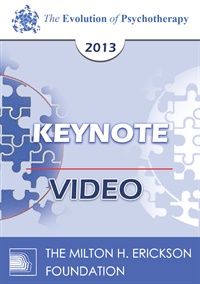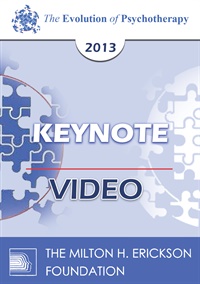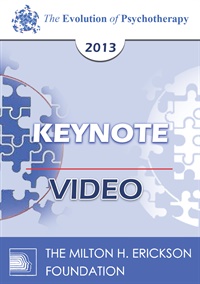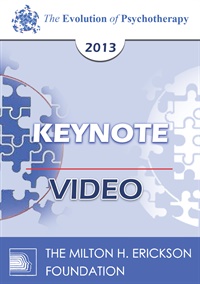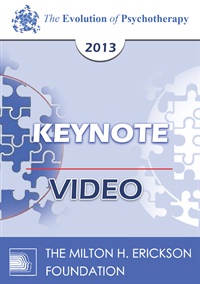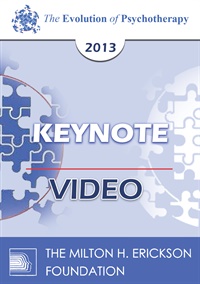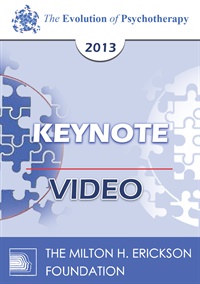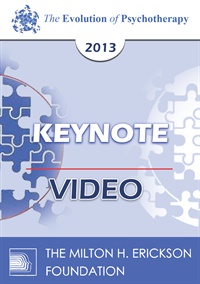- Average Rating:
- Not yet rated
- Topic Areas:
- Keynotes | Neuroscience | Psychotherapy
- Categories:
- Evolution of Psychotherapy | Evolution of Psychotherapy 2013
- Faculty:
- Daniel Amen, MD
- Course Levels:
- Master Degree or Higher in Health-Related Field
- Duration:
- 1:02:21
- Format:
- Audio and Video
- Original Program Date:
- Dec 12, 2013
- Short Description:
- By not looking at brain function in complex psychiatric cases, physicians often miss important information, which leads to erroneous diagnoses and missed opportunities for effective treatment. This lecture will explore how using functional brain imaging tools improves diagnoses and opens a new world of understanding and hope for many patients.
- Price:
-
Sale is $29.00
price reduced from Base Price - $59.00
Tags: Neuroscience Psychotherapy
- Average Rating:
- Not yet rated
- Topic Areas:
- Keynotes | Family Therapy | Therapist Development | Psychotherapy | Couples Therapy
- Categories:
- Evolution of Psychotherapy | Evolution of Psychotherapy 2013 | Pioneers in Couples and Family Therapy
- Faculty:
- Salvador Minuchin, MD
- Course Levels:
- Master Degree or Higher in Health-Related Field
- Duration:
- 43:07
- Format:
- Audio and Video
- Original Program Date:
- Dec 12, 2013
- Short Description:
- Minuchin shares video from an early meeting with a family to demonstrate key concepts in action. He reflects on how therapists can disrupt entrenched patterns, use language strategically, and create space for new roles and dynamics to emerge. The session illustrates how families themselves become agents of change—and how therapists evolve alongside them.
- Price:
-
Sale is $29.00
price reduced from Base Price - $59.00
- Average Rating:
- Not yet rated
- Topic Areas:
- Keynotes | Love | Marriage | Neuroscience | Psychotherapy | Couples Therapy
- Categories:
- Evolution of Psychotherapy | Evolution of Psychotherapy 2013
- Faculty:
- Diane Ackerman, MFA, PhD
- Course Levels:
- Master Degree or Higher in Health-Related Field
- Duration:
- 1:01:41
- Format:
- Audio and Video
- Original Program Date:
- Dec 12, 2013
- Short Description:
- Ms. Ackerman will be speaking about love in a time of illness, something she has lived with for many years, and has written about in her most recent book, One Hundred Names for Love. One day, Ackerman’s 74-year-old husband, a gifted author and professor, suffered a savage stroke. When he regained awareness he was afflicted with “global aphasia”—total loss of language—and could utter only a single syllable: “mem.” The standard therapies yielded only frustration. Diane soon found, however, that by harnessing their deep knowledge of each other, and her understanding of language and the brain, she could guide Paul back to the world of words.
- Price:
-
Sale is $29.00
price reduced from Base Price - $59.00
- Average Rating:
- Not yet rated
- Topic Areas:
- Keynotes | Psychotherapy | Consciousness | Neuroscience
- Categories:
- Evolution of Psychotherapy | Evolution of Psychotherapy 2013
- Faculty:
- Gerald Edelman, MD, PhD
- Course Levels:
- Master Degree or Higher in Health-Related Field
- Duration:
- 56:21
- Format:
- Audio and Video
- Original Program Date:
- Dec 11, 2013
- Short Description:
- Prevalent views of higher brain functions are based on the notions of computation and information processing. Various lines of evidence appear to be incompatible with this position and suggest instead that the brain operates according to a set of selectional principles. A theory addressing these principles, called Neural Darwinism, will be discussed. This theory has a direct bearing on our understanding of the neural basis of consciousness, a key issue in psychotherapy.
- Price:
-
Sale is $29.00
price reduced from Base Price - $59.00
- Average Rating:
- Not yet rated
- Topic Areas:
- Family Therapy | Keynotes | Psychotherapy | Systems Theory | Therapist Development | History of Psychotherapy
- Categories:
- Evolution of Psychotherapy | Evolution of Psychotherapy 2013 | Pioneers in Couples and Family Therapy
- Faculty:
- Salvador Minuchin, MD | Jeffrey Zeig, PhD
- Course Levels:
- Master Degree or Higher in Health-Related Field
- Duration:
- 55:34
- Format:
- Audio and Video
- Original Program Date:
- Dec 11, 2013
- Short Description:
- In conversation with Jeffrey Zeig, Minuchin reflects on his life’s work and the evolution of family therapy. He shares how his early experiences shaped his belief in disrupting certainty and making families central to the healing process. The dialogue explores core principles of systemic therapy, the therapist’s role in shaping change, and the ongoing relevance of context and connection in clinical work.
- Price:
-
Sale is $29.00
price reduced from Base Price - $59.00
- Average Rating:
- Not yet rated
- Topic Areas:
- Psychotherapy | Keynotes | Storytelling | Existential Therapy
- Categories:
- Evolution of Psychotherapy | Evolution of Psychotherapy 2013
- Faculty:
- Irvin Yalom, PhD
- Course Levels:
- Master Degree or Higher in Health-Related Field
- Duration:
- 1:54:32
- Format:
- Audio and Video
- Original Program Date:
- Dec 14, 2013
- Short Description:
- Dr. Yalom will discuss those aspects of therapy that he has discussed in his stories and novels, especially focusing on group therapy and existential issues in therapy. He will focus on the content of his new novel, The Spinoza Problem. Dr. Yalom will read and discuss two of his new psychotherapy teaching tales.
- Price:
-
Sale is $29.00
price reduced from Base Price - $59.00
- Average Rating:
- Not yet rated
- Topic Areas:
- Keynotes | Psychotherapy | Cognitive Behavior Therapy (CBT) | History of Psychotherapy
- Categories:
- Evolution of Psychotherapy | Evolution of Psychotherapy 2013
- Faculty:
- Aaron Beck, MD
- Course Levels:
- Master Degree or Higher in Health-Related Field
- Duration:
- 1:02:55
- Format:
- Audio and Video
- Original Program Date:
- Dec 15, 2013
- Short Description:
- The discussion will center on the evolution of the cognitive model of psychopathology and psychotherapy since its earlier stage. The expansion of therapy has included all of the common disorders and many of the medically related disorders will be explored. Finally, we will focus on the future of cognitive therapy and psychotherapy in general. Special attention will be paid to the relationship of other psychotherapies.
- Price:
-
Sale is $29.00
price reduced from Base Price - $59.00
- Average Rating:
- Not yet rated
- Topic Areas:
- Psychology | Keynotes | Positive Psychology | Psychotherapy
- Categories:
- Evolution of Psychotherapy | Evolution of Psychotherapy 2013
- Faculty:
- Martin Seligman, PhD
- Course Levels:
- Master Degree or Higher in Health-Related Field
- Duration:
- 57:25
- Format:
- Audio and Video
- Original Program Date:
- Dec 15, 2013
- Short Description:
- Positive Psychology measures and attempts to build PERMA: Positive Emotion, Engagement, Relationships, Meaning, and Accomplishment. I present recent findings from individuals, the clinic, organizations, and nations, as well as evidence-based techniques for building PERMA.
- Price:
-
Sale is $29.00
price reduced from Base Price - $59.00


